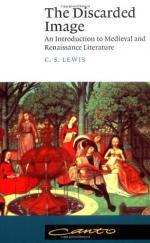
|
| Name: _________________________ | Period: ___________________ |
This test consists of 15 multiple choice questions and 5 short answer questions.
Multiple Choice Questions
1. What was historically important for the Middle Ages?
(a) Religious fervor.
(b) Writings.
(c) Heated debates.
(d) The model.
2. Which of these was the model also centered around?
(a) Religion.
(b) People.
(c) Values.
(d) Ideas.
3. How does Lewis label the model?
(a) A reservation.
(b) An ideal.
(c) A standard.
(d) A tradition.
4. What about medieval men does Lewis call strange?
(a) Their beliefs.
(b) All of these.
(c) Their authority.
(d) Their traditions.
5. What side of the medieval debate did Aristotle side with?
(a) Realism.
(b) Socialism.
(c) Nominalism.
(d) Nationalism.
6. What word does Lewis use to describe how most thoughts about medieval man arise?
(a) Naturally.
(b) Sporadically.
(c) Spontaneously.
(d) Randomly.
7. What was the model a backdrop for?
(a) Painters.
(b) Priests.
(c) Farmers.
(d) Writers.
8. What does Lewis say the model was NOT?
(a) Sensitive.
(b) Flexible.
(c) Tangible.
(d) Movable.
9. What separated nature from the sky?
(a) The passing of the sun.
(b) The ocean tides.
(c) The horizon.
(d) The orbit of the moon.
10. Which of the following was a medieval writer?
(a) Dante.
(b) Aristotle.
(c) Shakespeare.
(d) Milton.
11. What would guarantee the truth of something to a medieval man?
(a) Having it written in a book.
(b) Divining it from nature.
(c) Hearing it from a priest.
(d) Seeing signs in the sky.
12. Which of the following of the medieval man are studied in this book?
(a) Traditions.
(b) Routines.
(c) Beliefs.
(d) Foods.
13. What element of medieval times were effected by the model?
(a) Agricultural.
(b) Religious.
(c) Social.
(d) Authoritative.
14. What was the great project of most medieval writers?
(a) To make connections among differing beliefs in books.
(b) To explore the ideas and thought processes of man.
(c) To record as much history as possible.
(d) To bring a vast level of education to all men.
15. Who was Amyclas NOT intimidated by?
(a) Caesar.
(b) His wife.
(c) Cicero.
(d) His god.
Short Answer Questions
1. According to Lewis, how did medieval man come to start those things he calls obsolete?
2. What did the medieval men have to reconcile in their culture?
3. What did Macrobius think was the center of the universe?
4. Who do Christians say created nature?
5. What is the model a reflection of?
|
This section contains 356 words (approx. 2 pages at 300 words per page) |

|




